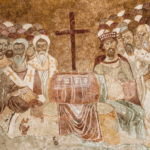An increasing number of Christian books, podcasts and blog posts tell us that we shouldn’t believe in a God who judges and punishes sinners—especially on the Cross of Jesus or eternally in Hell. Sooner or later, they assure us, everybody will be saved.
Here are 10 questions to ask when you encounter such theology:
1. Does it take God’s holiness seriously enough?
Sin creates all kinds of problems for us with ourselves, with the world and with the devil. But the biggest problem it creates for us is that it makes us unable to approach God himself. Our sins separate us from our holy God (Is 59:2) and he responds to them by barring our approach: with flaming swords (Gen 3:24 c.f. 4;16); with storm and darkness (Ex 19); with curtains and smoke (Lev 16). If none of that deters us he is likely to kill us (1Sam 6:19-20).
Sin creates all kinds of problems for us with ourselves, with the world and with the devil. But the biggest problem is that it makes us unable to approach God himself.
Some writers recoil from this. Heaven forbid that we should need to be saved from God. Isn’t God always close to us? (c.f. Ps 139:7-8; Acts 17:27) Didn’t Jesus come close to sinners without destroying them? Indeed. But these are modes of God’s presence where his radiant glory is concealed so that he can show us other aspects of his nature—namely, his mercy and patience (see more below). If we want to endure in God’s presence—if we want to survive when he reveals himself in his glory—then we need atonement. We need the sacrifice and blood of Jesus to secure our eternal redemption (Heb 9:12); to forgive our sins (v 22); to enter the holy presence of God (Heb 10:19-22).
2. Does it take sin seriously enough?
One recent writer asks whether we could ever believe in a good God if “everlasting torture is a possible final destiny.” It is a profound and troubling question. But the moment we concede that it might be appropriate for some people to suffer somewhat for their crimes, the jig is up. Because how can we quantify these things? Should Hitler suffer for a million years or only a hundred? What mathematical formula would calculate right sentence for a Ted Bundy or Jeffrey Epstein or Robert Mugabe … or you or me?
We inevitably judge people according to our own shifting personal prejudices and cultural taboos. But God has his own standards and criteria that are utterly alien to us. He judges us according to whether we love him with all our heart and soul and mind and whether we love our neighbour as ourselves (Matt 22:27-30). He condemns things that seem trivial to us like stealing fruit and secret lusts (Matt 5:27-30).
This immense gulf between our standards and God’s should make us question our instincts. What if God feels about ingratitude like we feel about child-rape or human trafficking? What if the offence of sin never goes away for him, no matter how long somebody “pays” for it? What if he refuses to be satisfied with anything other than the price he sets—the death of his own Son? We have no way to show he is wrong and every reason to mistrust our own opinions in these matters.
3. Does it abuse hermeneutics and theology to get around difficult passages?
Anybody who wants to resist the idea that God actively judges sin has their work cut out for them because both Testaments are so full of references to it. The God of the Bible floods the earth to kill all but eight people; he commands the destruction of corrupt cultures; he destroys cities with fire from heaven; he sends and plagues and snakes and famine and invaders against his own rebellious people etc. etc.
Through Jesus, God warns of greater judgments. He speaks of a time when “all the tribes of the earth will mourn” at the glorious coming of the Son of Man (Matt 24:30). He warns that Jesus will judge the entire world (Matt ). He speaks of a time when rulers and slaves will cry out in terror against “the face of him who is seated on the throne, and from the wrath of the Lamb.” (Rev 6:15-16)
Explaining all this away is like trying to dodge an avalanche. But some people will attempt it anyway. They will use half-truths and vaguery. They will say:
- God’s punishment is passive, allowing us to experience the consequences of our choices (sometimes true, but many other examples are described in more active terms).
- God doesn’t have emotions (such as “wrath”) like we do (true, but he chooses the analogies and the result is the same from our perspective);
- It’s all just a metaphor for … an inner struggle or a past event … or something (often more of a handwave than an argument).
Despite these valiant efforts, they usually give the game away at some point by admitting that this or that bit of the Bible is wrong and doesn’t really tell the truth about God. Which leads to our next point.
4. Does it pit Jesus against Scripture?
Some writers want to offer a “more Christlike” version of Christianity. What they mean by that is that Jesus—as God’s ultimate revelation—gives us a more reliable picture of God’s attitude to sinners than those bits of Scripture which speak of his wrath and judgment.
Apart from the fact already mentioned—that Jesus warns of worse judgments than those described in the OT (just read Matt 25)—this attitude to Scripture is completely at odds with that of Jesus. The Jesus we meet in the Gospels does not speak of replacing or fixing Scripture, but fulfilling it (c.f. Matt 5:17-19). The same Scriptures these modern theologians want to edit in the name of Jesus are the same ones Jesus (the incarnate Word) relied upon to direct his ministry.
The same Scriptures these modern theologians want to edit in the name of Jesus are the same ones Jesus (the incarnate Word) relied on to direct his ministry.
5. Does it confuse God’s patience with his indulgence?
How can God be wrathful and intolerant of sin when Jesus seems so kind toward sinners? The false teacher (following the script of false teachers through the ages c.f. Ps 50:20-21) wants you to think that it is because the wrath bits are wrong. Jesus wants you to understand that it is because God is patient. He likens himself to the last opportunity given to rebellious tenants before the hammer comes down (Mark 12:6-12). He compares his ministry to the final chance given to an unproductive fig tree (Luke 13:6-8).
Jesus is God’s last and greatest act of mercy to us sinners. So rejecting him brings the greatest judgment. Jesus says that those who encounter him and do not respond will be judged more harshly than any sinner of Old Testament times (Matt 11:20-24; 23:33-36).
Whoever believes in the Son has eternal life; whoever does not obey the Son shall not see life, but the wrath of God remains on him. (John3:36)
6. Does it falsify church history?
One gambit used by those who want to downplay God’s judgment is to argue that the idea of penal substitution—Jesus bearing the penalty for our sin—was novelty cooked up by Anselm (11th century) and the reformers. The early church, they argue, viewed Jesus’ mission as a rescue from Satan or a transformation of human existence—never as a pacification of an angry God.
Now it’s certainly true that the Church Fathers had a broader interest in the significance of the incarnation and the cosmic warfare aspects of the atonement than many of us (and we can learn things from them here!) We should also agree that no orthodox Christian would ever say that the atonement involved (loving) Jesus appeasing (nasty) God. The Father and Son are one in their mercy toward sinners and hostility to sin.
But it is simply wrong to say that the Church Fathers had no idea of substitutionary atonement. This is not the place for an extended discussion of this point (see here, here and here for more of that), but a couple of clear quotes might begin to illustrate the point:
For God was angry with man, and we had turned from God our loving Master, and Christ placing Himself between God and man reconciled both natures. But in what manner did He make Himself a mediator? By taking on Himself the punishment the Father must inflict upon us.
(John Chrysostom, Ascension-Day Sermon)
[W]e were enemies of God through sin, and God had appointed the sinner to die. There must needs therefore have happened one of two things; either that God, in His truth, should destroy all men, or that in His loving-kindness He should cancel the sentence. But behold the wisdom of God; He preserved both the truth of His sentence, and the exercise of His loving-kindness. Christ took our sins in His body on the tree, that we by His death might die to sin, and live unto righteousness.
(Cyril of Jerusalem, Catechetical Lecture 13.33)
7. Does it make Jesus a means to another end?
What was the mission of Jesus about at its deepest level? Was it about transforming the human race (as those in the Orthodox church tend to think)? Was it simply about saving individuals (as we evangelicals sometimes imagine)? If we think either of those answers were the ultimate reason for Jesus’ coming then a final and lasting judgment represents a failure of that mission.
But the Bible says that God’s deepest plans for creation have to do with his glory and the glory of his Son. And this glory is revealed both through giving life to the world and through judging it:
For as the Father raises the dead and gives them life, so also the Son gives life to whom he will. For the Father judges no one, but has given all judgment to the Son, that all may honour the Son, just as they honour the Father. (John 5:21-23 c.f. Rom 9:22-23)
God’s purposes are not thwarted by human rebellion, nor by eternal punishment. Either through us or despite us he and his Son will be glorified.
8. Does it muddle God’s love?
Those who protest against the idea of eternal wrath rightly remind us that “God is love”—not wrath. Judgment is his strange and alien work (Is 28:21).
This is an important point. But those who make it usually fail to see that God’s eternal and essential love is not his general good-will for us, but his love for his Son. It is Jesus—not us—who stands at the centre of God’s affection and plans.
This doesn’t mean that God doesn’t love you and me. But it means his love for us is will only be a passing shadow unless we are joined to its real object namely Christ.
God’s love for us is will only be a passing shadow unless we are joined to its real object namely Christ.
Only “in Christ”—in union with him through faith and Spirit—can we approach God as Father (Gal 4:6 c.f. John 8:42-47); or enter the most holy place (Heb 10:19-20); or have confidence that nothing can separate us from the love of God (Rom 8:32-39). Without him, none of this is true in any ultimate sense. God will be like the sun that gives us light from a distance but destroys us when we get too close. Only Jesus can make us able to enter that burning and see the face of God (Rev 22:3-4 c.f. Ex 33:20; Heb 10:26-27).
9. Does it undermine the mission of the church?
Surely all of us long to believe that there might be some hope for those who die apart from Christ: that, somehow, the torments of hell might ultimately convert them to saving faith; that “eternal” might not really really mean eternal (at least when it comes to punishment). Several theologians have embraced a theology of hope in this regard: “we can’t be sure,” they say “but let’s hope anyway.”
Unfortunately, this is a hope that Scripture never encourages. It is a theme that the Bible never develops despite many opportunities to do so—and despite many attempts to twist contrary passages (such as Rev 22:14-15) to that end.
The clear message of Scripture is that we are scheduled to die and then face judgement (Heb 9:27). It offers no prospect of post-mortem repentance; no promise that ultimately “all will be well” for those who reject Christ.
Those who preach universalism, then, are making a high-stakes gamble on the weakest of evidence. If they are right, they are proclaiming a message that the Bible wants to keep secret—and which doesn’t need to be made known anyway since “all manner of things shall be well” in the end regardless.
But if they are wrong, they are not simply undermining the urgency of the Great Commission, they are giving people a false hope that will encourage them to put-off responding to Jesus and be lost forever. What a foolish risk to take!
Those who preach universalism are making a high-stakes gamble on the weakest of evidence. What a foolish risk to take!
10. Does it offer false comfort?
God utters many judgements against such prophets who offer false comfort and cause people to miss out on God’s mercy.
He denounces those who “healed the wound of my people lightly, saying, ‘Peace, peace,‘ when there is no peace.” (Jer 6:14). He declares his wrath against the “foolish prophets who follow their own spirit” and who whitewash over walls that are about to collapse (Eze 13:1-16).
He warns those who ask their prophets to only speak of “smooth things”—those who “turn aside from the path, [and say] ‘let us hear no more about the Holy One of Israel.’”
Are you are tempted to be or to follow such a false prophet? Someone who denies that God is hostile to sin? Someone who doesn’t really believe that we need to be reconciled to God? Someone who wants us to think that there will be an eternity of opportunities to repent?
Don’t.
It will kill you and those who listen to you.
Go back to the Bible.















